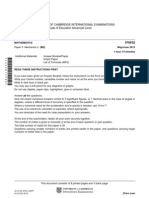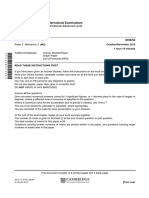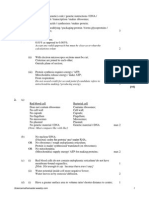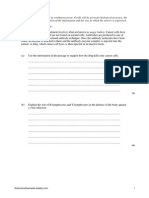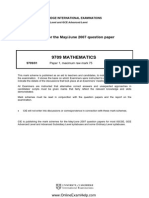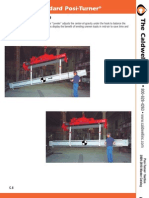0 ratings0% found this document useful (0 votes)
32 viewsHigher Mathematics Mathematics
Higher Mathematics Mathematics
Uploaded by
tess_15UNIVERSITY of CAMBRIDGE INTERNATIONAL EXAMINATIONS - Mechanics 2 (M2) may / June 2005 1 hour 15 minutes Additional materials: Answer Booklet / Paper Graph paper List of Formulae (MF9)
Copyright:
© All Rights Reserved
Available Formats
Download as PDF, TXT or read online from Scribd
Higher Mathematics Mathematics
Higher Mathematics Mathematics
Uploaded by
tess_150 ratings0% found this document useful (0 votes)
32 views8 pagesUNIVERSITY of CAMBRIDGE INTERNATIONAL EXAMINATIONS - Mechanics 2 (M2) may / June 2005 1 hour 15 minutes Additional materials: Answer Booklet / Paper Graph paper List of Formulae (MF9)
Original Title
9709_s05_qp_5
Copyright
© © All Rights Reserved
Available Formats
PDF, TXT or read online from Scribd
Share this document
Did you find this document useful?
Is this content inappropriate?
UNIVERSITY of CAMBRIDGE INTERNATIONAL EXAMINATIONS - Mechanics 2 (M2) may / June 2005 1 hour 15 minutes Additional materials: Answer Booklet / Paper Graph paper List of Formulae (MF9)
Copyright:
© All Rights Reserved
Available Formats
Download as PDF, TXT or read online from Scribd
Download as pdf or txt
0 ratings0% found this document useful (0 votes)
32 views8 pagesHigher Mathematics Mathematics
Higher Mathematics Mathematics
Uploaded by
tess_15UNIVERSITY of CAMBRIDGE INTERNATIONAL EXAMINATIONS - Mechanics 2 (M2) may / June 2005 1 hour 15 minutes Additional materials: Answer Booklet / Paper Graph paper List of Formulae (MF9)
Copyright:
© All Rights Reserved
Available Formats
Download as PDF, TXT or read online from Scribd
Download as pdf or txt
You are on page 1of 8
UNIVERSITY OF CAMBRIDGE INTERNATIONAL EXAMINATIONS
General Certicate of Education
Advanced Subsidiary Level and Advanced Level
HIGHER MATHEMATICS
MATHEMATICS
8719/05
9709/05
Paper 5 Mechanics 2 (M2)
May/June 2005
1 hour 15 minutes
Additional materials: Answer Booklet/Paper
Graph paper
List of Formulae (MF9)
READ THESE INSTRUCTIONS FIRST
If you have been given an Answer Booklet, follow the instructions on the front cover of the Booklet.
Write your Centre number, candidate number and name on all the work you hand in.
Write in dark blue or black pen on both sides of the paper.
You may use a soft pencil for any diagrams or graphs.
Do not use staples, paper clips, highlighters, glue or correction uid.
Answer all the questions.
Give non-exact numerical answers correct to 3 signicant gures, or 1 decimal place in the case of angles
in degrees, unless a different level of accuracy is specied in the question.
Where a numerical value for the acceleration due to gravity is needed, use 10ms
2
.
At the end of the examination, fasten all your work securely together.
The number of marks is given in brackets [ ] at the end of each question or part question.
The total number of marks for this paper is 50.
Questions carrying smaller numbers of marks are printed earlier in the paper, and questions carrying larger
numbers of marks later in the paper.
The use of an electronic calculator is expected, where appropriate.
You are reminded of the need for clear presentation in your answers.
This document consists of 5 printed pages and 3 blank pages.
UCLES 2005 [Turn over
www.OnlineExamHelp.com
2
1
A particle P of mass mkg is attached to the mid-point of a light elastic string of natural length 0.8 m
and modulus of elasticity 8 N. One end of the string is attached to a xed point A and the other end is
attached to a xed point B which is 2 m vertically below A. When the particle is in equilibrium the
distance AP is 1.1 m (see diagram). Find the value of m. [4]
2
A particle of mass 0.15 kg is attached to one end of a light inextensible string of length 2 m. The other
end of the string is attached to a xed point. The particle moves with constant speed in a horizontal
circle. The magnitude of the acceleration of the particle is 7 ms
2
. The string makes an angle of
with the downward vertical, as shown in the diagram. Find
(i) the value of to the nearest whole number, [3]
(ii) the tension in the string, [1]
(iii) the speed of the particle. [2]
UCLES 2005 9709/05/M/J/05
3
3
ABCDEF is the L-shaped cross-section of a uniform solid. This cross-section passes through the
centre of mass of the solid and has dimensions as shown in Fig. 1.
(i) Find the distance of the centre of mass of the solid from the edge AB of the cross-section. [3]
The solid rests in equilibrium with the face containing the edge AF of the cross-section in contact with
a horizontal table. The weight of the solid is WN. A horizontal force of magnitude PN is applied to
the solid at the point B, in the direction of BC (see Fig. 2). The table is sufciently rough to prevent
sliding.
(ii) Find P in terms of W, given that the equilibrium of the solid is about to be broken. [3]
4 A particle P of mass 0.4 kg is attached to one end of a light elastic string of natural length 1.5 m
and modulus of elasticity 6 N. The other end of the string is attached to a xed point O on a rough
horizontal table. P is released from rest at a point on the table 3.5 m from O. The speed of P at the
instant the string becomes slack is 6 ms
1
. Find
(i) the work done against friction during the period from the release of P until the string becomes
slack, [5]
(ii) the coefcient of friction between P and the table. [2]
UCLES 2005 9709/05/M/J/05 [Turn over
4
5 The acceleration of a particle moving in a straight line is (x 2.4) ms
2
when its displacement from
a xed point O of the line is x m. The velocity of the particle is v ms
1
, and it is given that v = 2.5
when x = 0. Find
(i) an expression for v in terms of x, [5]
(ii) the minimum value of v. [2]
6
A rigid rod consists of two parts. The part BC is in the form of an arc of a circle of radius 2 m and
centre O, with angle BOC =
1
4
radians. BC is uniform and has weight 3 N. The part AB is straight
and of length 2 m; it is uniform and has weight 4 N. The part AB of the rod is a tangent to the arc BC
at B. The end A of the rod is freely hinged to a xed point of a vertical wall. The rod is held in
equilibrium, with the straight part AB making an angle of
1
4
radians with the wall, by means of a
horizontal string attached to C. The string is in the same vertical plane as the rod, and the tension in
the string is T N (see diagram).
(i) Show that the centre of mass G of the part BC of the rod is at a distance of 2.083 m from the
wall, correct to 4 signicant gures. [4]
(ii) Find the value of T. [3]
(iii) State the magnitude of the horizontal component and the magnitude of the vertical component of
the force exerted on the rod by the hinge. [1]
UCLES 2005 9709/05/M/J/05
5
7
A particle A is released from rest at time t = 0, at a point P which is 7 m above horizontal ground. At
the same instant as A is released, a particle B is projected from a point Oon the ground. The horizontal
distance of O from P is 24 m. Particle B moves in the vertical plane containing O and P, with initial
speed V ms
1
and initial direction making an angle of above the horizontal (see diagram). Write
down
(i) an expression for the height of A above the ground at time t s, [1]
(ii) an expression in terms of V, and t for
(a) the horizontal distance of B from O, [1]
(b) the height of B above the ground. [1]
At time t = T the particles A and B collide at a point above the ground.
(iii) Show that tan =
7
24
and that VT = 25. [6]
(iv) Deduce that 7V
2
> 3125. [3]
UCLES 2005 9709/05/M/J/05
6
BLANK PAGE
9709/05/M/J/05
7
BLANK PAGE
9709/05/M/J/05
8
BLANK PAGE
Every reasonable effort has been made to trace all copyright holders where the publishers (i.e. UCLES) are aware that third-party material has been reproduced.
The publishers would be pleased to hear from anyone whose rights they have unwittingly infringed.
University of Cambridge International Examinations is part of the University of Cambridge Local Examinations Syndicate (UCLES), which is itself a department of
the University of Cambridge.
9709/05/M/J/05
You might also like
- 4-Cylinder Head Piston Coneecting Road & LinerDocument44 pages4-Cylinder Head Piston Coneecting Road & LinerMehar Tariq GoheerNo ratings yet
- 10jan M2Document8 pages10jan M2Ahmed NurulNo ratings yet
- CAT C13 2007 Service Bulletin (Cooling Sys, DPF, and Diagnostic Trouble Codes)Document34 pagesCAT C13 2007 Service Bulletin (Cooling Sys, DPF, and Diagnostic Trouble Codes)Jonathan Carlson100% (4)
- Why Is Casting An Important Manufacturing ProcessDocument2 pagesWhy Is Casting An Important Manufacturing ProcessSa'ad Sabar33% (3)
- 9709 s02 QP 5 PDFDocument4 pages9709 s02 QP 5 PDFtess_15No ratings yet
- 9709 s10 QP 43Document4 pages9709 s10 QP 43sriniyfaNo ratings yet
- University of Cambridge International Examinations General Certificate of Education Advanced Subsidiary Level and Advanced LevelDocument4 pagesUniversity of Cambridge International Examinations General Certificate of Education Advanced Subsidiary Level and Advanced LevelHubbak KhanNo ratings yet
- University of Cambridge International Examinations General Certificate of Education Advanced LevelDocument4 pagesUniversity of Cambridge International Examinations General Certificate of Education Advanced LevelHubbak KhanNo ratings yet
- 9709 s10 QP 43Document4 pages9709 s10 QP 43Abrar JahinNo ratings yet
- Cambridge International Advanced LevelDocument4 pagesCambridge International Advanced LevelBassem Khalid YasseenNo ratings yet
- Compiled P4 (M1)Document116 pagesCompiled P4 (M1)Roshaan Ashraf0% (1)
- 9709 s03 QP 4Document4 pages9709 s03 QP 4linusshyNo ratings yet
- A Level Math 51 Nov2013Document4 pagesA Level Math 51 Nov2013Ahmad HaikalNo ratings yet
- University of Cambridge International Examinations General Certificate of Education Advanced LevelDocument4 pagesUniversity of Cambridge International Examinations General Certificate of Education Advanced LevelHubbak KhanNo ratings yet
- University of Cambridge International Examinations General Certificate of Education Advanced LevelDocument4 pagesUniversity of Cambridge International Examinations General Certificate of Education Advanced LevelPrivate of ScienceNo ratings yet
- Higher Mathematics MathematicsDocument4 pagesHigher Mathematics Mathematicsdkorean493No ratings yet
- University of Cambridge International Examinations General Certificate of Education Advanced Subsidiary Level and Advanced LevelDocument4 pagesUniversity of Cambridge International Examinations General Certificate of Education Advanced Subsidiary Level and Advanced Levelahnaf.sharar.rhineNo ratings yet
- 9709 w15 QP 53Document4 pages9709 w15 QP 53yuke kristinaNo ratings yet
- Edexcel GCE: Monday 12 June 2006 Afternoon Time: 1 Hour 30 MinutesDocument4 pagesEdexcel GCE: Monday 12 June 2006 Afternoon Time: 1 Hour 30 MinutesMargarita SatrakiNo ratings yet
- A Level Math 41 Nov2013Document4 pagesA Level Math 41 Nov2013Ahmad HaikalNo ratings yet
- Mathematics: University of Cambridge International Examinations General Certificate of Education Advanced LevelDocument4 pagesMathematics: University of Cambridge International Examinations General Certificate of Education Advanced LevelKelvin SerimweNo ratings yet
- University of Cambridge International Examinations General Certificate of Education Advanced LevelDocument4 pagesUniversity of Cambridge International Examinations General Certificate of Education Advanced LevelKelvin SerimweNo ratings yet
- Cambridge International Advanced LevelDocument4 pagesCambridge International Advanced LevelBassem Khalid YasseenNo ratings yet
- 9709 s09 QP 5 PDFDocument4 pages9709 s09 QP 5 PDFKelvin SerimweNo ratings yet
- 9709 w15 QP 43Document4 pages9709 w15 QP 43yuke kristinaNo ratings yet
- Maths1 November 2012 Question Paper 52Document4 pagesMaths1 November 2012 Question Paper 52mrfr4nkofcNo ratings yet
- University of Cambridge International Examinations General Certificate of Education Advanced Subsidiary Level and Advanced LevelDocument4 pagesUniversity of Cambridge International Examinations General Certificate of Education Advanced Subsidiary Level and Advanced LevelPrivate of ScienceNo ratings yet
- Higher Mathematics Mathematics: PAPER 5 Mechanics 2 (M2)Document4 pagesHigher Mathematics Mathematics: PAPER 5 Mechanics 2 (M2)Ronald McdonaldNo ratings yet
- 9709 w10 QP 42Document4 pages9709 w10 QP 42Sherman TanNo ratings yet
- University of Cambridge International Examinations General Certificate of Education Advanced LevelDocument4 pagesUniversity of Cambridge International Examinations General Certificate of Education Advanced LevelKelvin SerimweNo ratings yet
- Edexcel GCE: 6679 Mechanics M3 Advanced/Advanced SubsidiaryDocument6 pagesEdexcel GCE: 6679 Mechanics M3 Advanced/Advanced SubsidiaryMargarita SatrakiNo ratings yet
- MathematicsDocument4 pagesMathematicsLalith77No ratings yet
- Cambridge International Advanced Subsidiary and Advanced LevelDocument4 pagesCambridge International Advanced Subsidiary and Advanced LevelWarda Ul HasanNo ratings yet
- m2 Gold 4Document17 pagesm2 Gold 4mwesigwaaNo ratings yet
- 9709 s13 QP 42Document4 pages9709 s13 QP 42Irtiza HussainNo ratings yet
- University of Cambridge International Examinations General Certificate of Education Advanced Subsidiary Level and Advanced LevelDocument4 pagesUniversity of Cambridge International Examinations General Certificate of Education Advanced Subsidiary Level and Advanced LevelLalith77No ratings yet
- Fmath p2 j99Document6 pagesFmath p2 j99SeanNo ratings yet
- Mathematics Mm2B Unit Mechanics 2BDocument8 pagesMathematics Mm2B Unit Mechanics 2BAhmed NurulNo ratings yet
- Mei Structured Mathematics: Mechanics 3Document71 pagesMei Structured Mathematics: Mechanics 3JW1212No ratings yet
- Cambridge International Advanced Subsidiary and Advanced LevelDocument4 pagesCambridge International Advanced Subsidiary and Advanced LevelSzeYee OonNo ratings yet
- M2pp Jan13Document96 pagesM2pp Jan13JW1212No ratings yet
- 0a.specimen M3Document4 pages0a.specimen M3Margarita SatrakiNo ratings yet
- Cambridge International Advanced Subsidiary and Advanced LevelDocument4 pagesCambridge International Advanced Subsidiary and Advanced Levelozairalimawjooth1No ratings yet
- 9709 w15 QP 42Document4 pages9709 w15 QP 42yuke kristinaNo ratings yet
- Mathematics: PAPER 4 Mechanics 1 (M1)Document4 pagesMathematics: PAPER 4 Mechanics 1 (M1)anzaaariNo ratings yet
- November 2015 (v1) QP - M1 CIE Maths A-LevelDocument4 pagesNovember 2015 (v1) QP - M1 CIE Maths A-LevelAbraham MensahNo ratings yet
- University of Cambridge International Examinations General Certificate of Education Advanced Subsidiary Level and Advanced LevelDocument4 pagesUniversity of Cambridge International Examinations General Certificate of Education Advanced Subsidiary Level and Advanced LevelHubbak KhanNo ratings yet
- University of Cambridge International Examinations General Certificate of Education Advanced Subsidiary Level and Advanced LevelDocument4 pagesUniversity of Cambridge International Examinations General Certificate of Education Advanced Subsidiary Level and Advanced Levelapurbodebnath5belyNo ratings yet
- Cambridge International Advanced Subsidiary and Advanced LevelDocument4 pagesCambridge International Advanced Subsidiary and Advanced LevelBassem Khalid YasseenNo ratings yet
- Cambridge International Advanced Subsidiary and Advanced LevelDocument4 pagesCambridge International Advanced Subsidiary and Advanced LevelKelvin SerimweNo ratings yet
- CPP1 RotationaldynamicsDocument14 pagesCPP1 RotationaldynamicsBNo ratings yet
- Miscellaneous Practice 6Document3 pagesMiscellaneous Practice 6Bryan FuryNo ratings yet
- M 1 June 2016Document8 pagesM 1 June 201624kennethtaiNo ratings yet
- University of Cambridge International Examinations General Certificate of Education Advanced LevelDocument8 pagesUniversity of Cambridge International Examinations General Certificate of Education Advanced LevelChristopher BarrettNo ratings yet
- A Level Applied Paper 3B Mechanics M17Document7 pagesA Level Applied Paper 3B Mechanics M17Stefan AlbertNo ratings yet
- 10 June M2Document6 pages10 June M2Mohammed Mohammed Al HassanNo ratings yet
- Math m1 Jan 2010Document4 pagesMath m1 Jan 2010Hoang Van NguyenNo ratings yet
- Cambridge International Advanced Subsidiary and Advanced LevelDocument4 pagesCambridge International Advanced Subsidiary and Advanced LevelSzeYee OonNo ratings yet
- Rotation Dynamics AssigntyrftyugrroooooooooooooooooooooooooooooooooooooomentDocument9 pagesRotation Dynamics AssigntyrftyugrroooooooooooooooooooooooooooooooooooooomentAnju Sahai100% (1)
- 6679 01 Que 20060612Document4 pages6679 01 Que 20060612charlesmccoyiNo ratings yet
- Cambridge International Advanced Subsidiary and Advanced LevelDocument4 pagesCambridge International Advanced Subsidiary and Advanced LevelJohn DoeNo ratings yet
- Hyperbolic Functions: with Configuration Theorems and Equivalent and Equidecomposable FiguresFrom EverandHyperbolic Functions: with Configuration Theorems and Equivalent and Equidecomposable FiguresNo ratings yet
- 3.2 Cell Transport Ans PDFDocument23 pages3.2 Cell Transport Ans PDFtess_15No ratings yet
- 3.1 Mitosis Ans PDFDocument7 pages3.1 Mitosis Ans PDFtess_15No ratings yet
- 3.2 Cell Transport PDFDocument146 pages3.2 Cell Transport PDFtess_15100% (1)
- 3.1 Cell Structure PDFDocument21 pages3.1 Cell Structure PDFtess_15No ratings yet
- 3.1 Cell Structure Ans PDFDocument6 pages3.1 Cell Structure Ans PDFtess_15No ratings yet
- 3.1 Mitosis PDFDocument29 pages3.1 Mitosis PDFtess_15No ratings yet
- Two Marks For Named Mutagenic AgentsDocument5 pagesTwo Marks For Named Mutagenic Agentstess_15No ratings yet
- 2.2 Biological Molecules PDFDocument73 pages2.2 Biological Molecules PDFtess_15No ratings yet
- 2.2 Biological Molecules Ans PDFDocument18 pages2.2 Biological Molecules Ans PDFtess_15No ratings yet
- 2 4 Atp Respiraton Ans PDFDocument5 pages2 4 Atp Respiraton Ans PDFtess_15No ratings yet
- 2 4 Atp Respiraton PDFDocument15 pages2 4 Atp Respiraton PDFtess_15No ratings yet
- Do Not Credit Answers Relating To Emotional or Psychological MaturityDocument2 pagesDo Not Credit Answers Relating To Emotional or Psychological Maturitytess_15No ratings yet
- 1 Diseases Ans PDFDocument7 pages1 Diseases Ans PDFtess_15No ratings yet
- 2.1 Digestion Ans PDFDocument7 pages2.1 Digestion Ans PDFtess_15No ratings yet
- One Answer Is Given in (I) and / or (Ii), Incorrect Answers Negate)Document2 pagesOne Answer Is Given in (I) and / or (Ii), Incorrect Answers Negate)tess_15No ratings yet
- 2.1 Homeostasis Ans PDFDocument32 pages2.1 Homeostasis Ans PDFtess_15No ratings yet
- 2.3 Enzymes PDFDocument72 pages2.3 Enzymes PDFtess_15No ratings yet
- 1.4 Selection and Evolution PDFDocument6 pages1.4 Selection and Evolution PDFtess_15No ratings yet
- 2.1 Homeostasis PDFDocument77 pages2.1 Homeostasis PDFtess_15No ratings yet
- 0 Variation PDFDocument27 pages0 Variation PDFtess_15No ratings yet
- 1.3 Continuity Ans PDFDocument3 pages1.3 Continuity Ans PDFtess_15No ratings yet
- 1 Diseases PDFDocument23 pages1 Diseases PDFtess_15No ratings yet
- 1.2 Nervous System PDFDocument92 pages1.2 Nervous System PDFtess_15No ratings yet
- 9709 s07 Ms 1 PDFDocument6 pages9709 s07 Ms 1 PDFtess_15No ratings yet
- 9709 s06 QP 7 PDFDocument4 pages9709 s06 QP 7 PDFtess_15No ratings yet
- 9709 s06 QP 6 PDFDocument4 pages9709 s06 QP 6 PDFtess_15No ratings yet
- Mechanical Measurements Lab ManualDocument26 pagesMechanical Measurements Lab ManualseminarprojectNo ratings yet
- Wu 2015 Seismic Design of Dams For Encyclopedia of Earthquake EngineeringDocument18 pagesWu 2015 Seismic Design of Dams For Encyclopedia of Earthquake EngineeringAnonymous 5exSerNo ratings yet
- Just Look For The Star!: Guided Drives DFM/DFM-B TOC Bookmark Guided Drives DFM/DFM-BDocument73 pagesJust Look For The Star!: Guided Drives DFM/DFM-B TOC Bookmark Guided Drives DFM/DFM-Bashwin ashokabhavanNo ratings yet
- Model Ls CatalogDocument4 pagesModel Ls CatalogThomas StempienNo ratings yet
- Brittle Fracture Modes of FailureDocument1 pageBrittle Fracture Modes of FailureAid Farhan MaarofNo ratings yet
- Chapter Four Class 9thDocument11 pagesChapter Four Class 9thAliNo ratings yet
- Training Material of Loader Brake SystemDocument86 pagesTraining Material of Loader Brake SystemFauziah100% (3)
- Welding of Missile SteelsDocument96 pagesWelding of Missile SteelsArun KumarNo ratings yet
- Data SheetDocument2 pagesData Sheetmetwar ankitNo ratings yet
- Topic T4: Pumps and Turbines AUTUMN 2022 ObjectivesDocument27 pagesTopic T4: Pumps and Turbines AUTUMN 2022 ObjectivesJeneveb NebatoNo ratings yet
- Standard Practice: 1995 EditionDocument8 pagesStandard Practice: 1995 EditionKaan TekinturhanNo ratings yet
- AIChE F01 06 Factors Influencing Vapor Crossflow ChannelingDocument6 pagesAIChE F01 06 Factors Influencing Vapor Crossflow Channelingmarkdeguzman788333No ratings yet
- PT Gajah Energie (English)Document18 pagesPT Gajah Energie (English)Gajendra KumarNo ratings yet
- Physics Note @NoteHeroBot (Chapters 2-5 Wo 3)Document193 pagesPhysics Note @NoteHeroBot (Chapters 2-5 Wo 3)katueditzNo ratings yet
- FEA CEP Report: ANSYS SoftwareDocument10 pagesFEA CEP Report: ANSYS SoftwareAli Raza100% (1)
- A New Approach in Manufacturing of Reverse Vending MachineDocument3 pagesA New Approach in Manufacturing of Reverse Vending MachineIjaems JournalNo ratings yet
- 6.5 Bending by Means of A Driving DeviceDocument4 pages6.5 Bending by Means of A Driving DeviceumbertiNo ratings yet
- Why Do Cats Land On Their Feet?Document4 pagesWhy Do Cats Land On Their Feet?missellkanNo ratings yet
- Material Ferrite DeterminationDocument5 pagesMaterial Ferrite DeterminationPemburu Jablay100% (1)
- How Manual Shift Gear WorksDocument11 pagesHow Manual Shift Gear WorkssimonchikNo ratings yet
- Preventive Maintenance Checklist Es Ceramics TechnologyDocument1 pagePreventive Maintenance Checklist Es Ceramics TechnologynavinNo ratings yet
- PB 320D Dan 320D L ExcavatorDocument2,480 pagesPB 320D Dan 320D L Excavatorkampungsaya79No ratings yet
- Damage Tolereance AnalysisDocument32 pagesDamage Tolereance AnalysisRkrmt Fredhiantoro M KadityaNo ratings yet
- Jupiter BSVI CircuitsDocument4 pagesJupiter BSVI CircuitsbijithktmNo ratings yet
- Woodward EasYgen Configuration Manual - CO LOGICDocument201 pagesWoodward EasYgen Configuration Manual - CO LOGICbacuoc.nguyen356No ratings yet
- Lab Manual Phy110 - Oct Feb23Document10 pagesLab Manual Phy110 - Oct Feb23widyan mizaNo ratings yet
- TCCL Plant SpecificationDocument368 pagesTCCL Plant Specificationshani5573No ratings yet













